Philosopical Essays
……Seeing the world through the telescope of philosophy
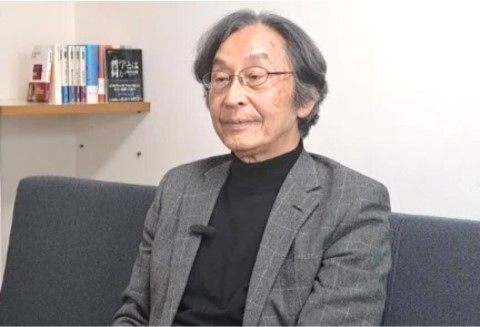
①Philosophical principle of war deterrence
〈5 Difference between religion and philosophy tables ②〉
〈5 哲学のテーブルと宗教のテーブル②〉
■Question:
The difference between religion and philosophy is not just in believing what the founder said, but in everyone coming together to reflect on the "principles" that serve as the wisdom necessary for living. However, it feels like the relay of "principles" that began with Thales in Greek philosophy is more aligned with the way of thinking in "science" rather than "philosophy." What are the differences between science and philosophy?
■質問
教祖が言ったことを信じるのではなく、みんなが生きていくために必要な知恵のもとになる「原理」を、みんなで考えあっていくことが宗教と哲学の違いなのですね。でも、ギリシャ哲学のタレスから始まった「原理」のリレーは、「哲学」というよりも「科学」の考え方に近いように感じました。科学と哲学の違いはどんなところにあるのでしょうか。
I have just explained the fundamental differences between the methods of religion and philosophy. Now, let’s also confirm the differences with the method of science. We will place the table of science next to the table of philosophy.
いま宗教と哲学の方法の根本的違いを説明しました。ついでに科学の方法についてもその違いを確認しましょう。哲学のテーブルの隣に科学のテーブルを置きます。
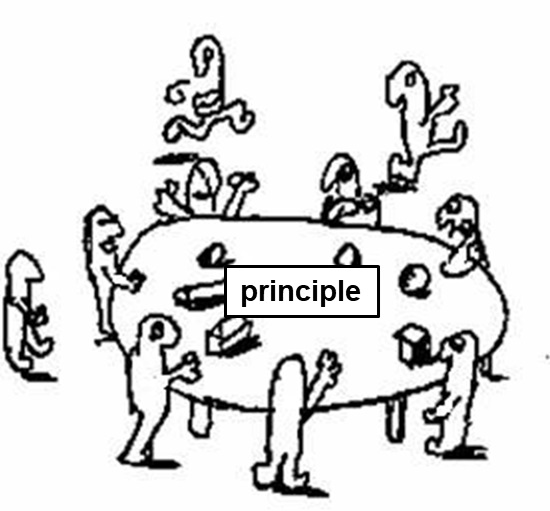
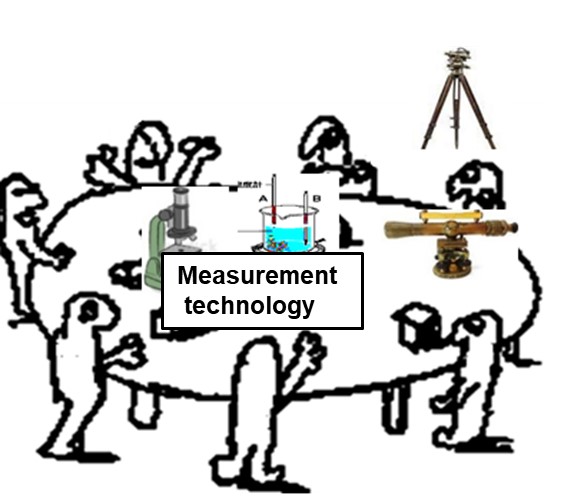
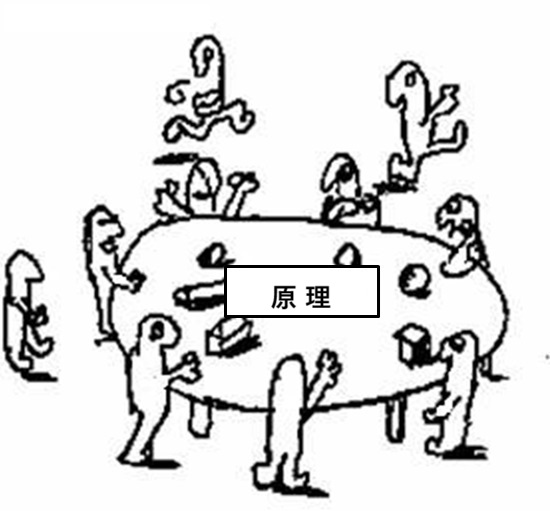
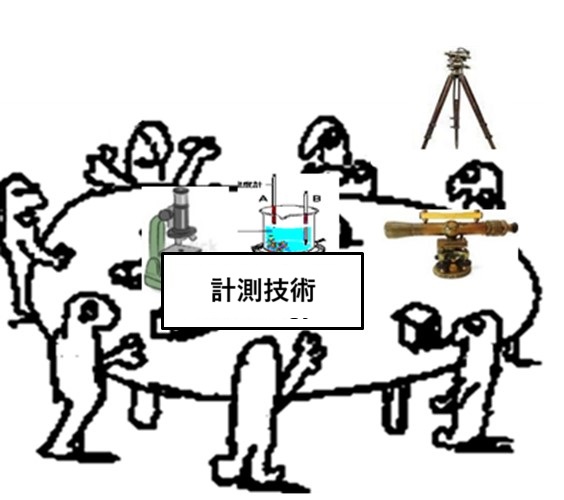
Some people say that philosophy is completely different from science, but that is a significant misunderstanding. The most important point is that the method of science emerged as an extension of the method of philosophy; in other words, philosophy is the father of science.
哲学は科学とはぜんぜん違う方法だと言う人もいるけれど、大きな間違いです。なりより重要なのは、科学の方法は哲学の方法の延長線上として現われたこと、つまり哲学が科学の父だということです。
Now that we have placed the two tables side by side, we can understand the following:
In the science table, the "principles" of philosophy are referred to as hypotheses. The method of science tests these "hypotheses" proposed by philosophy by actively engaging with nature. In other words, it asks nature itself whether "water" or "air" can truly be considered principles of everything. But how is this done? There is only one method to do this. To verify it, specific tools are required, such as microscopes, litmus paper, and thermometers, which are techniques for data measurement.
いま二つのテーブルを並べるとつぎのことが分かります。
科学のテーブルでは、哲学の「原理」は仮説と呼ばれます。科学の方法は、この哲学で出された「仮説」を、実際に自然に働きかけて検証する。つまり、ほんとに「水」や「空気」が万物の原理といえるかを自然自身に問うのです。しかしどうやって。その方法は一つしかない。これを検証するにはその道具、たとえば顕微鏡とか、リトマス紙、温度計といったデータ測定の技術が必要です。
In fact, since the modern era, aided by the development of mathematics, humanity has significantly advanced the techniques for measuring nature. It is precisely through this progress that Greek natural philosophy evolved into "natural science." Science verifies hypotheses through data measurement techniques, continuously refining them until it reaches a point where it can be confidently stated, beyond any doubt, that this is the case. At this point, the hypothetical principles are referred to as "laws." This also illustrates that the fundamental methods of concepts, principles, and re-exploration are maintained in science. Therefore, the advancement of data measurement techniques is essential to the methods of science.
じっさい、近代以後数学の発展に助けられて、人間は自然を計測する技術を大いに進歩させた。まさしくそのことでギリシャの自然哲学が「自然科学」に発展したのです。科学は、仮説をデータ測定技術で検証しながら、修正を繰り返して、最後に、誰が見てもたしかにこうとしか言えないという地点までこれを追いつめると、この仮説的原理は「法則」と呼ばれることになります。このとき、科学でも概念、原理、再展開という基本方法が守られていることが分かります。だからデータ計測技術の進歩が科学の方法の命なのです。
Now, let's summarize.
Only humans possess language, and only humans explain the world through language. This is the fundamental aspect of the human "world." However, it is impossible to depict the "truth" of the world through language. This is also a principle of philosophy. As Wittgenstein suggested, language can only draw a "picture" of the world. Humans create "maps" based on nature, but these maps are always abstract representations of nature. No one can depict the reality of nature itself as it is. Similarly, it is impossible to depict the "world itself" as it is using the tool of language.
さて、総括してみます。
人間だけが言葉をもっており、人間だけが言葉で世界説明をします。それが人間の「世界」の根本なのです。でも言葉で世界の「真理」を描くことはできない。これも哲学の原理です。言葉はヴィトゲンシュタインが示唆したように、ただ世界の「絵」を描くことができるだけです。人間は自然をもとに「地図」を描くけれど、地図はどこまでも自然をある仕方で抽象したものです。自然の現実それ自体をありのままに描くことは誰にもできない。それと同じで、言葉という道具で「世界それ自体」そのまま描くことは決してできないのです。
From ancient times, humans have tried to draw a "map" of the world using words. That is the explanation of the world. Without it, we are in trouble. And the first method of mapping that appeared was "story," which we call "religion." To be more precise, it is the method of "narrative-allegory."
大昔から、人間は言葉を使って世界の「マップ」を描こうとした。それが世界説明です。それがないと困るのです。そしてはじめに現われたマップの方法が「物語」で、それをわれわれは「宗教」と呼んでいる。もう少し正確に言うと、「説話-寓喩」の方法です。
Next came philosophy, which can be briefly called the "method of principles." Its characteristic is to create a universal explanation of the world that transcends cultural and religious boundaries, making it acceptable (understandable) to anyone. Science is a variation of this. Regardless of religion, ethnicity, or language, it is necessary to create a world explanation that anyone can understand. Therefore, it is meaningless if, from the beginning, diverse people with different values do not gather at the table of philosophy. The premise is that people with different ways of thinking, values, and customs are present, and despite this, the unique method of creating a common understanding that diverse people can agree on is the principle of the philosophical method. In other words, it can be called the "method of universal insight."
つぎに現われたのが哲学で、こちらは短く「原理の方法」と呼べますが、その特質は、文化や宗教の壁を超えて、つまり誰にとっても妥当する(納得できる)ような世界説明を、つまり普遍的な世界説明を作り出す方法だった。科学はそのヴァリエーションです。宗教や民族や言語が違っても、誰であれ納得できる世界説明にする必要がある。だから哲学のテーブルには、はじめから多様な、価値観の違う人間が集まならいと意味がない。考え方、価値観、習慣も違う人間がそこにいることが前提で、そこからにもかかわらず、多様な人が納得できる共通了解を作るという独自の方法、これが哲学の方法の原理だった。つまり「普遍洞察の方法」と言えるのです。
Alternatively, it can be said that only humans explain the world through language. And there are only two methods of explaining the world through language: the method of "narrative" in religion and the method of "principles" in philosophy. The former is fundamentally a communal method, where its power (effectiveness) is exerted through collective belief. The latter, on the other hand, is a method that creates common understanding beyond the community (an inter-communal method).
あるいはこうも言えます。人間だけが言葉で世界説明をする。そしておよそ言葉による世界説明の方法は、二つしかない。宗教の「物語」の方法と、哲学の「原理の方法」です。前者は基本、共同体の方法で、みなで信じることでその効力(威力)を発揮する。後者は、むしろ共同体を超えて共通了解を創り出す方法です(間共同体的な方法)。
Both have their merits and demerits. The "narrative" of religion accumulates human wisdom and resonates directly with the human heart through its storytelling. This can sometimes save people from suffering. Moreover, this method is fundamental not only to religion but also to literature and history.
ともに功罪があります。宗教の「物語」は人間の生の知恵がたまっていて、その語り方で人間の心に直接響く。そのことで人を苦しみから救うこともある。またこれは、宗教だけでなく、文学や歴史の根本方法になっている。
In contrast, the "method of principles" is effective in creating universal common understanding. This is because it weaves words in a way that form a universal common understanding. However, it also has a significant weakness. The use of concepts logically is its weakness, meaning that philosophy is always accompanied by logical sophistry that can turn white into black. Despite being a method of principles, "false principles" also emerge frequently.
これに対して「原理の方法」は、普遍的な共通了解を生み出す点では力を発揮する。普遍的な共通了解になるような仕方で言葉を編んでいく方法だからです。しかし大きな弱点もある。概念を論理的に用いることから弱点で、すなわち哲学には、白を黒と言いくるめる論理的なキベン論がいつもつきまとってくる、という点です。もともと原理の方法なのに、そこでは「偽の原理」もどんどん出てくるのです。
Anyway, by thinking this way, one important thing becomes clear. Humans are creatures that explain the world through language. Or rather, the "world" depicted by language is precisely the human world. However, world explanations created through "stories" inevitably lead to various different world explanations, which often result in significant conflicts and become causes of disputes. The belief that one's own view is correct and others are wrong always arises. Religious conflicts are a typical example of this. Why does this happen? Broadly speaking, it is as follows.
ともあれ、こう考えることで一つの重要なことがはっきりします。人間は言葉によって世界説明をする生き物です。あるいは、言葉で描かれた「世界」、それがまさしく人間の世界なのです。しかし「物語」によって創られた世界説明では、必ず、さまざまな異なった世界説明が現われ、それはしばしば大きく対立して争いの原因となる。自分たちの考えこそ正しい、ほかは間違っている、といったことがつねに生じる。宗教対立がその典型です。なぜそうなるのか。大きく言えばこうです。
Regarding questions such as how nature works or what kind of society is necessary for everyone to be free, a universally understandable "world explanation" is needed.However, when it comes to matters that include values, such as what is most important for humans or society, or what is the most beautiful, it is impossible to create a "world explanation" that establishes strict common understanding. This is also a principle of philosophy.
自然がどうなっているのか、万人が自由であるためにはどんな社会が必要か、こういう問題については、共通了解可能な「世界説明」が必要です。しかしたとえば人間にとって、社会にとっていちばん大事なことは何か、また何が最も美しいか、といった、いわば価値観を含むようなことがらについては、厳密な共通了解が成立するような「世界説明」は作れない。これも哲学の原理です。
Since ancient times, narrative "world explanations" by humans or communities have always generated antagonistic conflicts, primarily because they include differences in values (sometimes differences in interests are expressed as differences in values). Religious conflicts are a typical example of this.
さて大昔から、人間あるいは共同体による物語的な「世界説明」は、つねに敵対的な対立を生み出してきたが、その大きな原因は、そこに価値観の違いが含まれているからです(利害の違いが、価値観の違いとして表現されている場合もある)。宗教の対立はその典型です。
However, even in modern society, where science has advanced, there are serious conflicts of opinion regarding human and social issues. Ideological conflicts are an example of this, and they can even lead to wars. Overcoming these serious conflicts caused by differences in values is a very important challenge for philosophy.
しかし科学が進んだ現代社会でも、人間や社会の問題について深刻な考え方の対立が存在する。 イデオロギーの対立がそれです。そこから戦争が起こったりもする。この価値観の対立による申告なコンフリクトをどう克服するかは、哲学にとってたいへん重要な課題です。
First of all, remember that the method of philosophy was to skillfully extract universal common understanding from various different ways of thinking. However, philosophy does not create a more universal (true) religious doctrine from the conflict between, for example, Christianity and Islam. That is not possible. Instead, philosophy says this: there is no way to overcome the conflict (antagonistic relationship) that arises here other than the idea of "mutual recognition of doctrines."
In other words, the only principle to overcome the antagonistic conflict of doctrines is the "mutual recognition of each other's faith."
そもそも哲学の方法は、さまざまに異なった考え方からうまく普遍的な共通了解を取り出す方法だったことを思いだしてください。といっても哲学は、たとえばキリスト教とイスラム教の対立から、もっと普遍的な(真の)宗教の教義を作り出すわけではない。そんなことはできないのです。そうではなく、哲学はこういいます。「教義の相互承認」という考え方以外には、ここで生じるコンフリクト(敵対関係)を克服する方法はどこにもない、と。別にいえば、教義の敵対的対立を克服する唯一の原理は、それぞれの「信仰の相互承認」だけであると。
As this makes it somewhat clear, philosophy is not a method for creating an absolutely correct "world explanation."
Humans live by creating various "world explanations" in different ways, and certain values always enter into these explanations. Therefore, they constantly conflict and cause disputes. If each group cannot abandon the belief that their own view is the "truth," it becomes an absolute "dead end."
これで少しはっきりしたように、哲学は、何か絶対的に正しい「世界説明」を作り出す方法というのではありません。人間は、いろんな仕方でさまざまな「世界説明」を作り上げて生きている。そしてその中に必ず一定の価値観が入りこんでいる。だからそれはたえず対立し、コンフリクトを起こす。そしてもしそれぞれに、自分たちの考えこそ「真理」だという考えをすてられなければ、もうそこが絶対の「行き止まり」になる。
However, the philosophical method is a way to go beyond the conflicts of "world explanations" that would normally reach a dead end and move further ahead. Grasping this principle of the philosophical method firmly is an essential premise when we consider various contemporary issues.
しかし、哲学の考え方の方法は、普通はそこで行き止まりになる「世界説明」の対立を超えて、さらに先まで進める方法です。こうした哲学の原理の方法をしっかりつかんでおくことは、われわれがさまざまな現代的問題を考えるときに、どうしても必要な前提となるのです。
Now, regarding what the method of philosophy is, I have said various things, but to summarize as simply as possible, it is as follows:
There are countless different ways of thinking (world explanations) about various matters in the world. Philosophy attempts to gather all these thoughts as much as possible and express the most important core points of the matters in the simplest possible keywords. The essence of philosophical thinking lies in whether it can pinpoint keywords (principles) that make many people grasp the essence of the matter through the relay of the philosophical table. By reviewing the "principles" of excellent philosophers, we should be able to realize this.
さて、哲学の方法とは何かについて、いろいろ言いましたが、できるだけシンプルにまとめるとつぎのようになる。
世の中には、さまざまなことがらについて無数の違った考え方(世界説明)がある。哲学は、これらの考えを可能なかぎりすべてとりまとめて、ことがらの最も重要な核心点を、できるかぎり簡潔なキーワードで表現しようと試みるのです。哲学のテーブルのリレーを通して、多くの人々にことがらの本質を「ピン」とこさせるようなキーワード(原理)を言い当てることができるかどうか、そこに哲学の考え方の要諦があります。優れた哲学者たちの「原理」を通覧していくと、われわれはそのことに思い当たるはずです。